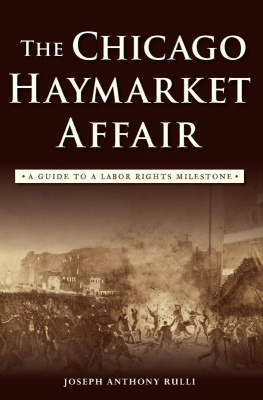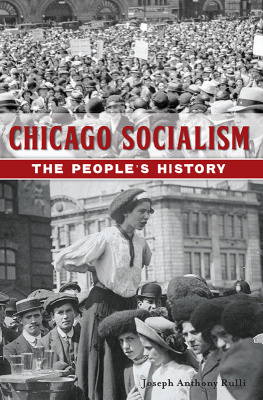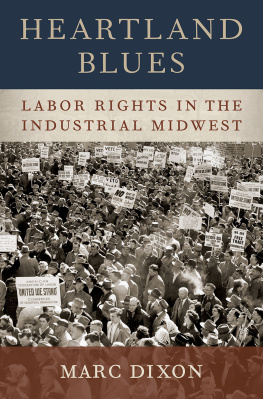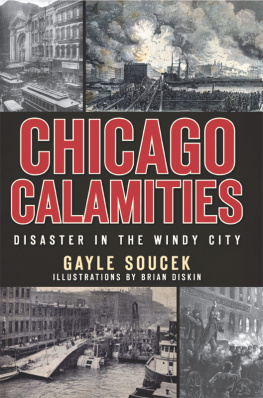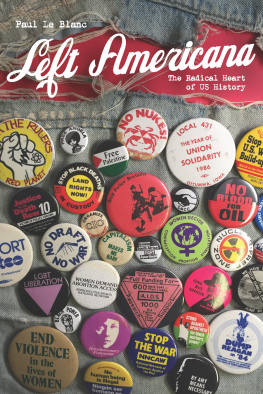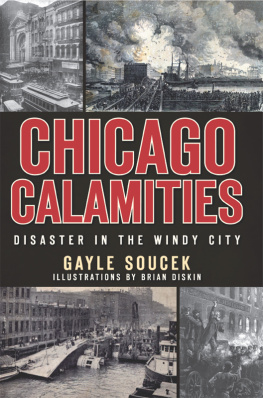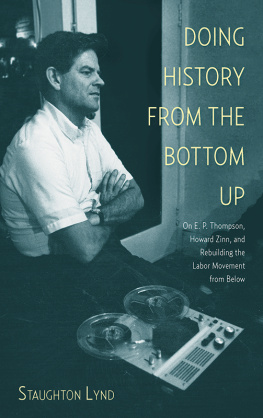


Published by The History Press
Charleston, SC
www.historypress.net
Copyright 2016 by Joseph Anthony Rulli
All rights reserved
Front cover: Courtesy of the Chicago History Museum.
First published 2016
e-book edition 2016
ISBN 978.1.43965.820.8
Library of Congress Control Number: 2016941438
print edition ISBN 978.1.46713.574.0
Notice: The information in this book is true and complete to the best of our knowledge. It is offered without guarantee on the part of the author or The History Press. The author and The History Press disclaim all liability in connection with the use of this book.
All rights reserved. No part of this book may be reproduced or transmitted in any form whatsoever without prior written permission from the publisher except in the case of brief quotations embodied in critical articles and reviews.
We are like dwarfs set on the shoulders of giants, from which we can see more and further than they, not so much because of the keenness of our own sight or the magnitude of our own stature, but because we are sustained and raised up by their gigantic greatness.
Bernard of Chartres (d. circa 1130)
CONTENTS
AYN RAND COULD KICK KARL MARXS ASS:
OBJECTIVITY AND HISTORY
What Does It All Mean?:
Historical Perspective and the Haymarket Affair
IN THEIR FOOTSTEPS:
THE SITES RELATED TO THE HAYMARKET AFFAIR
Newspaper Row
The Times, the Tribune, the Daily News, the InterOcean
The Staats-Zeitung, the Arbeiter-Zeitung, Die Fackel, the Alarm
LIST OF PHOTOGRAPHS
LIST OF TABLES, DIAGRAM AND MAP
ACKNOWLEDGEMENTS
As in any work, written or otherwise, a person makes use of the toil, struggle and joy of those who have gone before. So it is with this piece presented here.
Firstly, I give heartfelt thanks to Felix and Catherine Rulli; Cathy, Bill, Michael and Samantha Kazmierczak; and Terri Rulli, with whom Ive shared life. We are the progeny of immigrants from the nineteenth and twentieth centuries and the descendants of laborers since before the Caesars; we are who we are, in part, because of them. And by association, my gratitude goes to the people of northern Indiana, particularly South Bend, Mishawaka and Elkhart. Weve been bathed in the rich racial and ethnic pool of Michiana and have received our work ethic there. I hope this book contributes to furthering pride in the journey made.
A writer is always indebted to those who teach mechanics and method but, more importantly, those who are able to instill a love for the craft. I was fortunate to have parents who sacrificed for my sisters and my education as well as for a grandmother who planted my love of story and opera and history. I was blessed many times over in my foundational education at St. John the Baptist School and St. Josephs High School in South Bend to have such stalwart teachers in all disciplines, but especially in social studies and English. My love of history, the written word and of words that I could someday write was nurtured at these institutions and at home, and (you should be thankful, too) Im a better writer for all of them.
Also, my thanks go to the fine esprit dcorps in the Second City: to Bucky Halker, Stephanie Seawell and the members of the Illinois Labor History Society in Chicago, past and presentmy most sincere gratitude for the encouragement, challenges and assistance given me. Theyve been a valued part of the creation of this book, and I cherish their work.
To the staff and supporters of the Chicago History Museum, especially in the Research Center there: Patrick Ashley and Gretchen Neidhardt, special thanks to Noel Dwyer, Michael Featherstone, Ellen Keith, Lesley Martin and Scott Ondercin, who were very attentive to me in my sometimes twice-a-week visits into the directories, microfilms and maps. Many thanks also to Jessica Herczeg-Konecny, Angela Hoover, Ron Solano and Sarah Yarrito in the Rights and Reproduction Department for their time, patience and good humor and to Joseph Campbell and Stephen Jensen for their work with the photographic archive. I give an abundance of thanks for their professionalism, dedication and passion for the preservation and exhibition of the good, the bad and the ugly of the greatest city in the world.
To everyone in Chicago who, in the course of walking around this place, I bumped into, bugged, bothered, dragged on the early tours or babbled on with the details of this work while in its birthing: their enthusiasm and curiosity have been infectious and spurred me on to complete the project.
A large amount of my gratitude is to the City of Chicago itself and all its connected services, particularly the Chicago Transit Authority. I have been a regular passenger of trains and buses ever since arriving here in the winter of 2006 and can say public transportation for me is second nature. The economic benefits to me, the ease of travel and my always-spicy fellow riders have allowed me to get to where I need to be in a timely (most of the time) and safe manner. This book would be a lot different, a lot less accurate and a lot duller had I not been able to go and check out sites firsthand whenever the whim struck.
And, by extension, to the Chicago Police Departmentemphatic thanks for the risks taken daily for our safety and the efforts being made to work with communities in finding constructive solutions to our problems. In the midst of these all-important responsibilities, my thanks for the time given me in parts of this project.
To the Edgy Writers of the bimonthly workshops, my (almost) speechless gratitude for their honest input, critique and support in the fictional and nonfictional parts of my world. Their presence with me at our gatherings and at my individual readings and play performances, as well as our collaboration on the anthology project, hearten me constantly. And, by extension, my thanks go to the staff at Zanzibar Caf and Nookies in Edgewater, without whom our meetings would be drier and a bit more tasteless.
To my financial and techno-teams in the digital and corporeal realms in bringing about the first incarnation of the book, originally called The Working Class SmellsSo Do RosesNathanael Filbert, Katrina Willis, Nick Moutric, Landis Wiedner, Mark Willis, Kristina Zaremba, Connie Hansen and Connie Deuschelmy gratitude pours out for the selfless sharing of their gifts with me. Without that work, this book would be greatly impoverished.
To Hilary Parrish, senior editor, and the staff at The History Press for their belief in this project, I give special thanks, and among them a most heartfelt thanks to Ben Gibson, my commissioning editor, for his passion in the material, his attendance on my tour of the sites very early on as well as he and his wife attending the world premiere of the first stage production of one of my plays; and, most especially, for the guidance he has provided me in this heretofore uncharted territory. Another thank you goes to Michael Kinsella of Arcadia Publishing, whom I first queried about the project. After speaking on the phone with me, he put me in contact with Ben, and this is the result.
To one of my earliest fans and best friendsand the one most successful at keeping me from ever possessing anything close to an over-inflated sense of selfmy thanks go to Austin Black.
Next page
